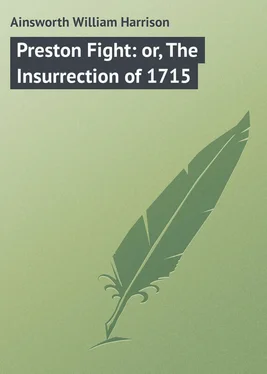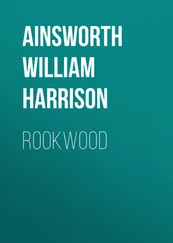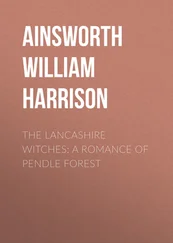William Ainsworth - Preston Fight - or, The Insurrection of 1715
Здесь есть возможность читать онлайн «William Ainsworth - Preston Fight - or, The Insurrection of 1715» — ознакомительный отрывок электронной книги совершенно бесплатно, а после прочтения отрывка купить полную версию. В некоторых случаях можно слушать аудио, скачать через торрент в формате fb2 и присутствует краткое содержание. ISBN: , Жанр: foreign_prose, на английском языке. Описание произведения, (предисловие) а так же отзывы посетителей доступны на портале библиотеки ЛибКат.
- Название:Preston Fight: or, The Insurrection of 1715
- Автор:
- Жанр:
- Год:неизвестен
- ISBN:http://www.gutenberg.org/ebooks/49851
- Рейтинг книги:4 / 5. Голосов: 1
-
Избранное:Добавить в избранное
- Отзывы:
-
Ваша оценка:
- 80
- 1
- 2
- 3
- 4
- 5
Preston Fight: or, The Insurrection of 1715: краткое содержание, описание и аннотация
Предлагаем к чтению аннотацию, описание, краткое содержание или предисловие (зависит от того, что написал сам автор книги «Preston Fight: or, The Insurrection of 1715»). Если вы не нашли необходимую информацию о книге — напишите в комментариях, мы постараемся отыскать её.
Preston Fight: or, The Insurrection of 1715 — читать онлайн ознакомительный отрывок
Ниже представлен текст книги, разбитый по страницам. Система сохранения места последней прочитанной страницы, позволяет с удобством читать онлайн бесплатно книгу «Preston Fight: or, The Insurrection of 1715», без необходимости каждый раз заново искать на чём Вы остановились. Поставьте закладку, и сможете в любой момент перейти на страницу, на которой закончили чтение.
Интервал:
Закладка:
At length, he appeared, and desired her to follow him. Wishing to avoid the servants, who were crowded in the great hall, he led her down a back staircase to a small room on the ground floor, where he obtained a lantern. In another minute, they had crossed the court, and reached the door of the chapel.
The little structure, it has been said, was screened by trees, and the place was so dark, it would have been difficult to find the door, save with the lantern’s aid.
A slight shiver ran through Anna’s frame as she entered the building, but she attributed the feeling to the damp atmosphere. Meanwhile, Father Norham had lighted a couple of tapers at the altar, and their feeble glimmer enabled her to survey the place.
Its simplicity and diminutive size pleased her, and reassured her. Knowing she would have to remain there alone till midnight, she might have felt some misgivings had the room been large and sombre. Fortunately, she was not aware that there was a vault beneath, in which rested the earl’s ancestors. Marble tablets were on the walls, but she did not read them.
After an exhortation, to which she listened devoutly, the priest withdrew. Thus left alone, she knelt down at the altar, and was soon engrossed in prayer.
For awhile she continued thus employed, but at length a feeling of drowsiness came over her, which she found it impossible to resist.
How long she slept she could not tell, but when she awoke the place was buried in darkness.
What had happened while she slumbered? And how came the tapers to be extinguished?
Very much alarmed, she started to her feet, and somehow – though she scarcely knew how – made her way to the door.
It was fastened. Father Norham must have locked it when he went out
She was thus to be kept in that dreadful place – for dreadful it now seemed to her – till his return at midnight.
She could not guess the hour, but she might have to wait long – very long! Moments seemed ages now. Her terror was insupportable.
Just then she heard the castle clock, and counted the strokes.
Eleven! Another agonising hour had to be borne! – another hour! – when five minutes had been intolerable!
Rendered desperate by terror, she went back to the altar, and kneeling down once more, prayed for deliverance.
Becoming somewhat calmer, she felt ashamed of her weakness, and tried to persuade herself that the tapers might have gone out by accident. The notion gave her momentary courage.
But her fears returned with greater force than before as she heard a deep sigh, seemingly proceeding from some one close beside her, and she fancied she discerned a dusky figure.
“Who is there?” she cried. “Is it you holy father?”
No answer was returned, but a slight sound was heard, and the figure seemed to retreat.
She heard and saw no more.
Uttering a cry, she fell senseless at the foot of the altar, where she was found shortly afterwards by Father Norham and her mother.
The former having brought the lantern with him, her situation was perceived at once, and the prompt application of a smelling-bottle by Lady Webb quickly restored her to consciousness. She was able to walk back to the mansion, but begged not to be questioned as to the cause of her fright till the morrow, when she should have quite recovered from its effects.
XII. – A LETTER FROM THE EARL OF MAR
NEXT morning she related the mysterious occurrence to them both, but they treated it very lightly, though neither could understand how the tapers had been extinguished. All the rest they regarded as the effect of an over-excited imagination.
“No one could have entered the chapel,” remarked the priest. “I locked the door, and took the key with me. However, you must dismiss all these thoughts from your mind, daughter. To-day the chapel will present a very different appearance from what it did last night.”
“Yes – it will be the scene of your betrothal,” said Lady Webb.
“I would rather the ceremony took place elsewhere,” said Anna.
“It cannot be,” said Father Norham. “His lordship has arranged the matter. The prince will be present, and it would be a great disappointment to the household to be deprived of the sight.”
“It would also be a great disappointment to Sir John and myself,” observed Lady Webb. “Besides there are several guests in the Castle who ought not to be excluded. For many reasons, therefore, there must be no change in the plan.”
“Don’t say a word, mamma,” said Anna. “I am quite convinced. My objections were ridiculous. The morning is delightful, and a walk in the garden will set me quite right.”
“You will find Lord Derwentwater, his majesty, and almost all the company assembled on the lawn,” said Lady Webb. “Come, I will take you thither. Perhaps, Father Norham will accompany us.”
“With the greatest pleasure,” replied the priest.
On Anna’s appearance, Lord Derwentwater, who was standing with the company on the terrace, came forward to meet her; and as he approached, he remarked that she looked very pale. This did not detract from her beauty, but rather gave interest to her countenance – at least, in his eyes. He made some slight allusion to the circumstance, but she laughed it off.
Not much passed between them, for the prince presently came up to offer her his greetings, and by this time her cheek was flushed.
“I have news for you, fair lady,” said his highness, “and I desire to be the first to communicate it. I do not mean to rob you of your lover, so you may rest quite easy on that score. My proposed journey to London will not be undertaken. A messenger has just arrived at the castle bringing me a letter from the Earl of Mar, Secretary of State to Queen Anne. His lordship had engaged that I should see the queen, and led me to hope that great results would follow from the interview. These confident expectations are now at an end, and my project must be given up. Lord Mar writes that the queen, forgetful of her promises, refuses to receive me, and that if I should present myself at Saint James’s Palace, he will not answer for my safety. Under such circumstances, it would be madness to make the attempt It is well that I arranged with the Earl of Mar to write to me here, as if I had not heard from him, I should have started on the journey. What might then have befallen me I know not. Perchance, imprisonment in the Tower, in hope of compelling me to relinquish my pretentions to the crown – but that I never would have done.”
“Your majesty need not give us that assurance,” cried Anna. “But imprisonment would have been grievous, and might have disheartened your friends.”
“From the first I have been opposed to the scheme, as your majesty is aware,” said Lord Derwentwater; “and I cannot, therefore, affect to regret its abandonment.”
“I do not wonder you are better pleased to remain where you are, cousin,” said the prince.
“I shall be far better pleased if your majesty will decide upon summoning all your partisans to arms,” said the earl.
“Nothing would rejoice me more than to see ten thousand men assembled at the castle,” said Anna with increased enthusiasm, “and eager for their king to lead them on to victory. That is how I should like to see your majesty march to London – and Lord Derwentwater with you.”
“Ay, I will never be left behind,” cried the earl.
Fire lighted up the prince’s eyes as they spoke, but it faded away.
“It cannot be,” he said. “It cannot be.”
“What cannot be, my liege?” cried Anna, regarding him fixedly. “Not the insurrection? Not the march to London?”
“No,” he replied. “The Earl of Mar, in his letter counsels me to make no immediate movement.”
Читать дальшеИнтервал:
Закладка:
Похожие книги на «Preston Fight: or, The Insurrection of 1715»
Представляем Вашему вниманию похожие книги на «Preston Fight: or, The Insurrection of 1715» списком для выбора. Мы отобрали схожую по названию и смыслу литературу в надежде предоставить читателям больше вариантов отыскать новые, интересные, ещё непрочитанные произведения.
Обсуждение, отзывы о книге «Preston Fight: or, The Insurrection of 1715» и просто собственные мнения читателей. Оставьте ваши комментарии, напишите, что Вы думаете о произведении, его смысле или главных героях. Укажите что конкретно понравилось, а что нет, и почему Вы так считаете.












